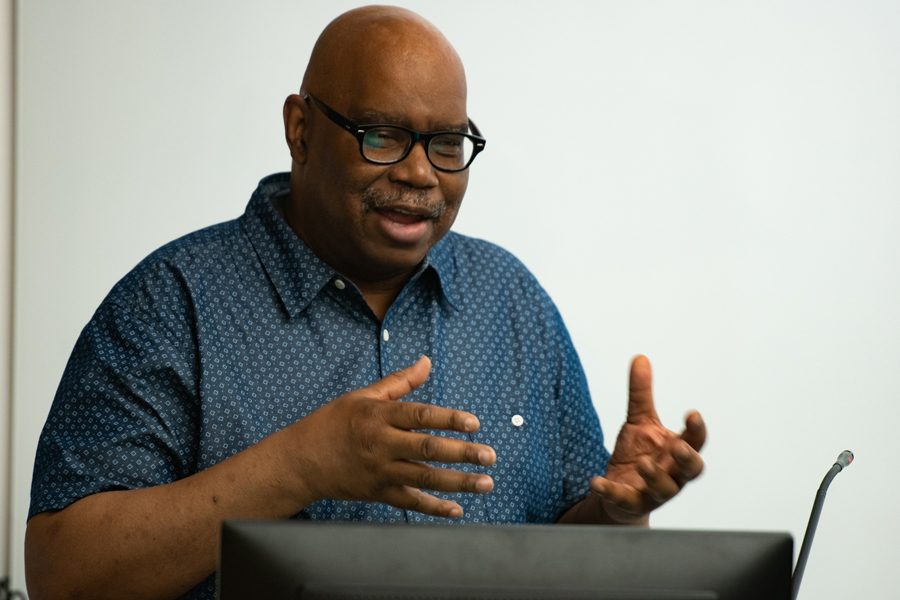Chicago filmmaker speaks at NU AfroFuturism Film Fest
Evan Robinson-Johnson/Daily Senior Staffer
Floyd Webb speaks at the AfroFuturism Film Festival. The festival, put on by Living in Color and the Black Arts Initiative, worked to highlight award-winning afrofuturism films.
May 30, 2019
A&E
Through a futuristic universe of vibranium and superheroes, “Black Panther” took the world by storm in 2018 and introduced millions to the genre of afrofuturism. Last night, Living in Color and the Black Arts Initiative brought that world to Northwestern through the first AfroFuturism Film Fest.
The event, held in the Kresge Forum, featured five award-winning short films from Black World Cinema’s AfroFuturism Film Competition, followed by a discussion led by Chicago filmmaker Floyd Webb. Black World Cinema, a group that presents black films and filmmakers not recognized in mainstream cinema, defines afrofuturism as the reimagination of the future through a black lens — with a focus on art, science and technology.
SESP sophomore Eliza Gonring helped organize the event. She said she wanted to bring the festival to Northwestern after attending Black World Cinema’s AfroFuturism Film Competition last summer in Chicago.
Gonring is a part of Living in Color, a student group focused on uplifting art by people of color. She said it’s important for black art to take up space on campus, and hopes the film festival inspired people to take further look at afrofuturism as a real art form. Since people spend a lot of time thinking about the current problems, she said it’s fun to imagine a different world.
“It’s healthy to imagine a healthy black future,” Gonring said. “I hope people enjoy these films as much as I did.”
The main act of the night was Webb’s talk, during which he answered questions about afrofuturism and filmmaking from the audience.
Webb, a 30-year filmmaking veteran, said he became interested in afrofuturism after viewing 1950s sci-fi television shows and Alfred Hitchcock films as a kid. He said afrofuturism began as simply “black science fiction,” but now often has a focus on wanting to change the world through art.
“Black people were a captive people who had to use art and expression in order to oppose the conditions they were under,” Webb said. “When free black people began to write books, they would imagine free nations.”
Many people think of afrofuturism as a newer genre, but Webb said speculative black fiction dates back to the 1800s. He added a lot the writing and films of that period, though, were erased because black people didn’t have the same resources to archive art as white Hollywood. As a result, Webb said he wants to use his films to both entertain and educate.
Communication freshman Lauren Washington, who attended the event, said she admired the festival’s work highlighting black films. Often, she said, black people don’t have agency over stories about them, because of the lack of representation in Hollywood. Because of this, she said it’s nice to see these voices presented authentically.
Washington said she’s had a growing interest in afrofuturism since seeing Janelle Monáe’s short film “Dirty Computer.” She added events like this encourage her to find more ways to incorporate afrofuturism into her own work.
“As a freshman, it’s cool to see short films like this created by us because it reminds me that I can make things like this too,” Washington said. “All I have to do is just go out and create.”
Email: janeawilson2022@u.northwestern.edu
Twitter: @janeaAwilson



